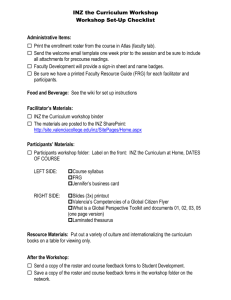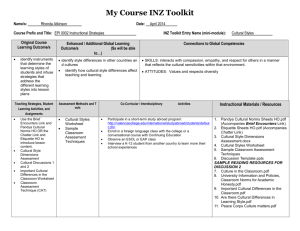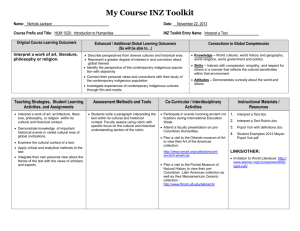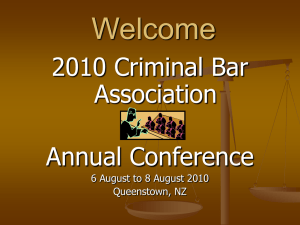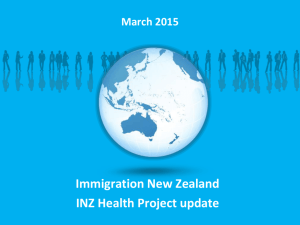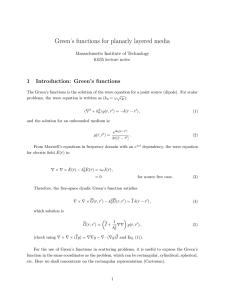Memo template - Immigration New Zealand
advertisement
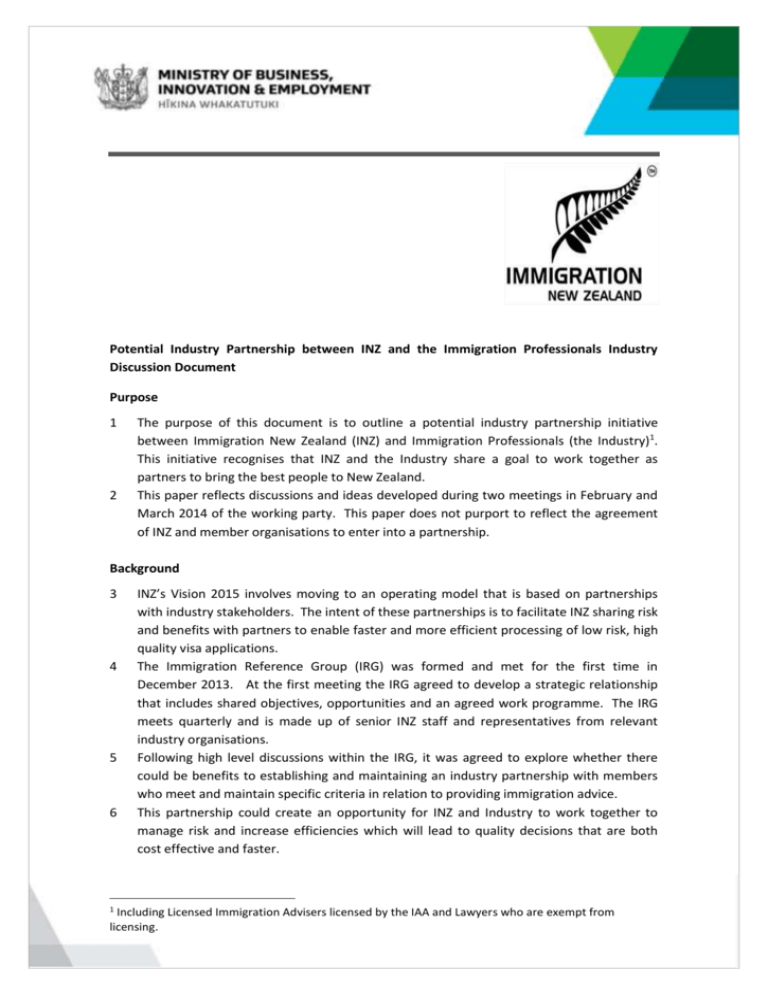
Potential Industry Partnership between INZ and the Immigration Professionals Industry Discussion Document Purpose 1 2 The purpose of this document is to outline a potential industry partnership initiative between Immigration New Zealand (INZ) and Immigration Professionals (the Industry)1. This initiative recognises that INZ and the Industry share a goal to work together as partners to bring the best people to New Zealand. This paper reflects discussions and ideas developed during two meetings in February and March 2014 of the working party. This paper does not purport to reflect the agreement of INZ and member organisations to enter into a partnership. Background 3 4 5 6 1 INZ’s Vision 2015 involves moving to an operating model that is based on partnerships with industry stakeholders. The intent of these partnerships is to facilitate INZ sharing risk and benefits with partners to enable faster and more efficient processing of low risk, high quality visa applications. The Immigration Reference Group (IRG) was formed and met for the first time in December 2013. At the first meeting the IRG agreed to develop a strategic relationship that includes shared objectives, opportunities and an agreed work programme. The IRG meets quarterly and is made up of senior INZ staff and representatives from relevant industry organisations. Following high level discussions within the IRG, it was agreed to explore whether there could be benefits to establishing and maintaining an industry partnership with members who meet and maintain specific criteria in relation to providing immigration advice. This partnership could create an opportunity for INZ and Industry to work together to manage risk and increase efficiencies which will lead to quality decisions that are both cost effective and faster. Including Licensed Immigration Advisers licensed by the IAA and Lawyers who are exempt from licensing. Potential industry partnership model 7 8 9 The IRG agreed to form a small working party which was tasked by the IRG to progress the potential industry partnership by developing ideas that could form the basis of an industry partnership. The working party has approached this task with the understanding that the integrity of the immigration system must be maintained and the interests of both INZ and Industry must be considered. Early discussions of a potential industry partnership have resulted in the following ideas which may form the basis of a partnership framework. Concept 10 INZ and the Industry agree to share the risks and benefits associated with processing visa applications. This will improve standards and practices as well as information flows and feedback, which will inform and shape the ongoing partnership. This will be achieved by INZ outsourcing assessment tasks associated with certain applications that are lower risk and received in higher volumes by INZ through an industry partnership. It is envisaged this will result in faster and more efficient processing of specific types of applications prepared by experienced immigration professionals which will benefit shared customers and New Zealand. Principles 11 An industry partnership between the parties will be based on adherence to the following principles; a. b. c. d. The Industry and INZ are committed to a working relationship that is professional and respectful and benefits each party. The Industry and INZ are committed to maintaining open and ongoing communication. The Industry and INZ will be responsive where any issues are identified that relate to the partnership. The Industry and INZ will monitor and minimise any adverse risks that may arise. Entry Criteria / Performance Standards 12 In order to gain entry to the industry partnership the following list of criteria (which is neither definitive nor exhaustive) must be met; ongoing inclusion in the partnership would be dependent upon these standards and requirements being maintained; a. Be a company / partnership / legal entity; b. Be based in New Zealand2; c. Employ at least one adviser with either; 2 i. Five years’ continuous licensing from the Immigration Advisers’ Authority, or ii. Five years’ continuous registration with the New Zealand Law Society. This criteria ensures swift communication is achievable and will assist in building and maintaining relationships. d. Have approved internal management structure and systems including the ability to have cases 2 person checked; e. Participate in an audit and assurance process; f. Hold professional indemnity insurance; g. Hold membership of one of the following professional bodies; i. New Zealand Law Society; or ii. New Zealand Association for Migration and Investment; or iii. New Zealand Association of Immigration Professionals; or iv. New Zealand Immigration Institute; h. Minimum 90% approval rate for all applications (within agreed streams3) for each of the past five financial years; i. Maximum 10% Returned Failed Lodgement for all applications (within agreed streams) for each of the past five financial years. Benefits 13 Benefits made available to participants may include, but are not limited to; a. Improved application processing times and sharing of tasks. These will be realised by; i. All applications (within agreed streams) being processed by the Henderson Area Office. ii. Guaranteed processing times by stream/application type. iii. Guaranteed timeframes for internal processes (e.g. medical assessor referrals, labour market checks). iv. Dedicated relationship manager and assessment team. v. Provision of clear application lodgement criteria. The partner will state that a qualifying application is complete upon submission. vi. Allowing ‘front end loading’ of labour marker checks, where required. If evidence of comment from Work and Income was provided with an application, INZ would not undertake a further referral to this agency. b. Improved, streamlined processes and use of new technology; i. Applications may be submitted to Henderson Area Office electronically (scanned copies via e-mail) removing the need to provide physical documents unless specifically requested by an Immigration Officer. ii. Supporting documents may be submitted electronically removing the need to provide originals or certified copies, unless specifically requested. iii. Issuing of label-less visas (e-visas), the physical passport may not be required when the visa is issued. c. Formal recognition of the industry partnership: 3 The final list will be discussed and agreed as this work progresses with an aim to include as many streams as practical. S61 cases and Refugee applications will not be included. i. 14 Participating immigration professionals will be listed on INZ’s website as Industry Partners. Benefits to INZ may include, but are not limited to; a. Receiving applications from industry partners which require minimal work to assess because INZ has confidence that the preparation of each application that has been undertaken by its Industry Partner is of high quality and conforms with current immigration instructions. This will lead to the applications being assessed faster. b. Developing an aspirational set of entry criteria to raise the level of quality within the industry in terms of low risk, high volume applications, while rewarding those experienced industry members who have established practices and processes which meet the expected level. Next steps 15 It is likely that any partnership would initially be designed as a small scale pilot of a set duration, possibly 12 months. This would allow the parties to work closely in order to redesign and re-shape the processes involved to ensure the partnership delivers maximum benefit while exposing neither party to unacceptable risk, and at the same time making provision for maximum ongoing take-up of the partnership. 16 Both parties note that INZ is prepared to work alongside the industry to develop this partnership, however the industry may following consultation decide not to pursue an industry partnership. 17 Immigration New Zealand will circulate this paper to the IRG for any final amendments with an invitation to meet with members through a consultation process that will include meetings in Wellington, Auckland and Christchurch as well as an online survey.
